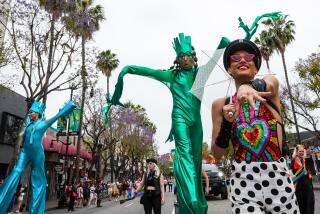Rose Parade governed by unique set of laws
Streams of Silly String, flying tortillas and long lines at the ladies’ rooms during past parades have inspired a unique set of laws that govern Monday’s Rose Parade and other special events in Pasadena.
City ordinances address everything from construction of grandstand seating and the sale of parade programs to acts of political protest.
Under a 1992 ordinance, disrupting or impeding a parade can land a person a $1,000 fine and up to six months in jail.
FULL COVERAGE: 2012 Rose Parade
“There were legitimate safety concerns. With all the equestrian units, what if horses got spooked?” said former Pasadena Mayor Bill Paparian, who introduced the measure after a particularly raucous parade that year. “This isn’t just something frivolous that lawmakers passed.”
The Pasadena city attorney’s office does not have records on how many people have been charged with disrupting the Rose Parade, but most parade-related arrests are for drunk and disorderly conduct among spectators camping along the route, according to police.
Another 1992 ordinance targets food fights and spraying Silly String in celebration of the Rose Parade and its irreverent counterculture counterpart, the Doo Dah Parade.
Tortilla-tossing became Doo Dah tradition in 1979 after the owners of the now-defunct Chromos Bar pelted bystanders from a parade vehicle and the crowd returned fire, said organizer Tom Coston.
City officials proposed the so-called Silly String ordinance to prevent damage to paint on passing cars and because the substance was difficult to remove from paved surfaces, according to city documents.
Noisemakers also have been at issue. A 1960 law makes it illegal to “sell or give away within the city any horn device” in Pasadena between 8 a.m. on New Year’s Eve and 5 p.m. on the day of the Rose Parade.
The oldest Rose Parade regulation still on the books is a 1912 ordinance requiring parade parking lot operators to publicly post fees and obtain permits, or risk $100 in fines and up to 30 days in the city jail.
A 1947 ordinance cracked down on sales of counterfeit parade programs. That year it also became a misdemeanor to stage a parade or “play any drum, triangle, tambourine, or any wind or string instrument upon any public street or alley” without a permit, punishable by a $500 fine and up to six months in jail.
Decades-old laws also set out specific requirements for grandstand seating, including minimum seat-board widths of 10 inches and that no less than three nails secure wooden support joints.
An ordinance last revised in 1987 requires grandstand operators to set aside a majority of public toilets for women’s use. Seating blocks for between 4,000 and 5,000 people, for example, must have three toilets for men and at least nine for women.
City officials conduct extensive inspections of grandstands, but don’t seem to be counting bathrooms these days, said Sindee Riboli, president of Sharp Seating Co., which has managed all Rose Parade grandstands for 27 years.
Portable restrooms segregated by gender also are a relic of past Rose and Doo Dah parades.
“I could imagine back then that a woman wouldn’t want to follow where a man did his business, but I guess we’re unisexual now,” Coston said. “We’ve come a long way.”
FULL COVERAGE: 2012 Rose Parade
More to Read
Sign up for Essential California
The most important California stories and recommendations in your inbox every morning.
You may occasionally receive promotional content from the Los Angeles Times.










